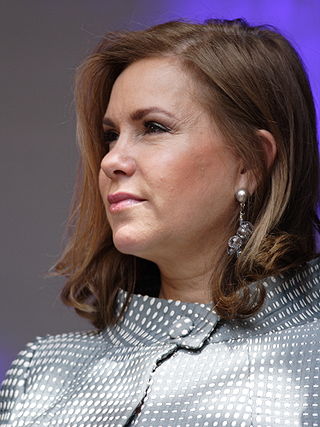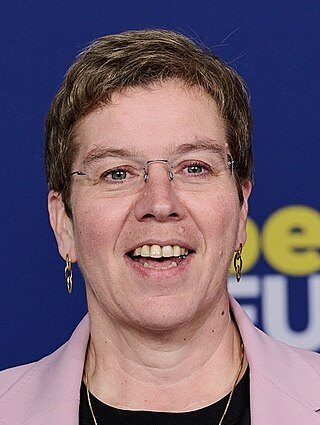Footnotes
- 1 2 3 "Membres depuis 1857" (in French). Council of State. Archived from the original on 2009-11-03. Retrieved 2009-09-19.
- 1 2 "Nomination du nouveau Maréchal de la Cour". Grand Duchy of Luxembourg. 28 March 2007. Retrieved 2008-05-19.
Pierre Mores (born 21 April 1950 in Esch-sur-Alzette) [1] is a Luxembourgish politician, jurist, and administrator. He is in charge of administering Luxembourg's largest private-sector pension fund, the White Collar Workers' Pension Fund (CPEP). [2]
He was appointed to the Council of State on 20 March 1990 to replace Edmond Reuter. [1] He was named Vice-President of the Council on 14 January 2000, and replaced Marcel Sauber as President on 29 April 2003. He held the position until 30 September 2007, when he was replaced by Alain Meyer. [1]
Upon leaving that office, he was appointed "Marshal of the Court" (French : Maréchal de la Cour; German : Hofmarschall; Luxembourgish : Haffmarschall), [2] i.e. the Chief of Staff of the Head of State, the Grand Duke of Luxembourg.

Luxembourg, officially the Grand Duchy of Luxembourg, is a small landlocked country in Western Europe. It is bordered by Belgium to the west and north, Germany to the east, and France to the south. Its capital and most populous city, Luxembourg City, is one of the four institutional seats of the European Union and the seat of several EU institutions, notably the Court of Justice of the European Union, the highest judicial authority. Luxembourg's culture, people, and languages are greatly influenced by France and Germany; for example, Luxembourgish, a Germanic language, is the only national language of the Luxembourgish people and of the Grand Duchy of Luxembourg, French is the only language for legislation, and all three – Luxembourgish, German and French – are used for administrative matters in the country.
Luxembourg is a parliamentary representative democratic monarchy, whereby the prime minister is the head of government, and the multi-party system. Executive power is under the constitution of 1868, as amended, exercised by the government, by the grand duke and the Council of Government (cabinet), which consists of a prime minister and several other ministers. Usually, the prime minister is the leader of the political party or coalition of parties having the most seats in parliament. Legislative power is vested in both the government and parliament. The judiciary is independent of the executive and the legislature.

Henri is Grand Duke of Luxembourg, reigning since 2000. He is the eldest son of Grand Duke Jean and Princess Joséphine-Charlotte of Belgium, as well as a first cousin of King Philippe of Belgium. In 2019, his net worth was estimated around US$4 billion.

Jean-Claude Juncker is a Luxembourgish politician who was the 23rd prime minister of Luxembourg from 1995 to 2013 and 12th president of the European Commission from 2014 to 2019. He also was Finance Minister from 1989 to 2009 and President of the Eurogroup from 2005 to 2013.

Prince Guillaume, Hereditary Grand Duke of Luxembourg, is the heir apparent to the crown of Luxembourg. He has served as the Lieutenant-Representative of Luxembourg since 2024.

Prince Félix of Luxembourg, Prince of Bourbon-Parma and Prince of Nassau is the second son of Henri, Grand Duke of Luxembourg, and Maria Teresa, Grand Duchess of Luxembourg. He is currently fourth in the line of succession to the throne of Luxembourg.

The Alternative Democratic Reform Party is a conservative and mildly populist political party in Luxembourg. It has five seats in the sixty-seat Chamber of Deputies, making it the fourth-largest party. In 2024, the party received its first seat in the European Parliament.

François Biltgen is a Luxembourgish politician who has served as Minister for Justice, Minister for Communications and the Media, Minister for Religious Affairs, Minister for the Civil Service and Administrative Reform, and Minister for Higher Education and Research. until 2013.

Jean Asselborn is a Luxembourgish former politician who served in the government of Luxembourg as Minister for Foreign Affairs from 2004 until 2023. He also served as Deputy Prime Minister from 2004 to 2013, under Prime Minister Jean-Claude Juncker. At the time of his retirement from national politics in 2024, he consistently ranked as the most popular politician in Luxembourg, with a popularity rate of around 80%.

Maria Teresa is Grand Duchess of Luxembourg as the wife of Grand Duke Henri, who acceded to the throne in 2000.

Victor Nicolas Bodson was a socialist Luxembourgish politician and lawyer who held the posts of Minister of Justice, Public Works, and Transport for long periods of time in the 1940s and 1950s, including in exile during World War II, when Luxembourg was occupied by Nazi Germany.
Paul Wilwertz was a Luxembourgish politician for the Luxembourg Socialist Workers' Party (LSAP). He was Mayor of Luxembourg City for five years, as well as sitting in the Chamber of Deputies and holding positions in the government.

Luc Frieden is a Luxembourgish politician and lawyer who serves as the 25th prime minister of Luxembourg since November 2023. A member of the Christian Social People's Party (CSV), he held numerous cabinet positions in the Luxembourgish government between 1998 and 2013, notably serving as the minister for the Treasury and Budget during the transition from the Franc to the Euro and as minister of Finance during the European debt crisis. Frieden was president of the Luxembourgish Chamber of Commerce and Eurochambres, the business federation of European Chambers of Commerce and Industry.

The first Juncker–Asselborn Government was the government of Luxembourg between 31 July 2004 and 23 July 2009. It was led by, and named after, Prime Minister Jean-Claude Juncker and Deputy Prime Minister Jean Asselborn.

Xavier Bettel is a Luxembourgish lawyer and politician who serves as the 14th deputy prime minister of Luxembourg and as the minister for Foreign Affairs since 2023. He served as the 24th prime minister of Luxembourg from 2013 to 2023. He was a member of the Chamber of Deputies (1999–2013) and Mayor of Luxembourg City (2011–2013).

Sven Clement is a Luxembourgish politician and MP of the Pirate Party Luxembourg of which he is also one of the founders.

Princess Stéphanie, Hereditary Grand Duchess of Luxembourg, is the wife of Hereditary Grand Duke Guillaume, the heir apparent to the throne of Luxembourg. She became engaged to the Hereditary Grand Duke on 26 April 2012 and married him, in a civil ceremony, on 19 October 2012, followed by a religious service the next day. The couple have two sons, Prince Charles and Prince François.

Education in Luxembourg is multilingual and consists of fundamental education, secondary education and higher education.

Émile Speller was a Luxembourgish military officer and the commander of the country's Gendarmes and Volunteers Corps during the German invasion of Luxembourg in World War II. He also served as aide-de-camp to several members of the Grand Ducal Family throughout his career and chamberlain of the Grand Ducal court.

Martine Deprez is a Luxembourgish politician who serves as Minister of Health and Social Security in the Frieden-Bettel government since 17 November 2023. She is a member of the CSV.